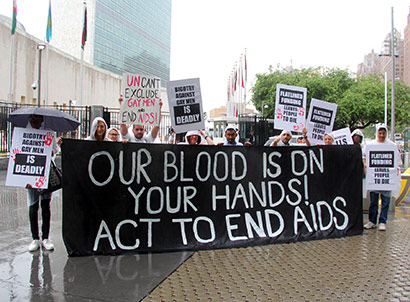Blood on their hands: Russia blocks LGBT rights from historic UN Aids resolution

Pic: Health GAP
A number of countries have succeeded in removing support for LGBT equality from Wednesday’s landmark resolution to end the Aids epidemic.
Russia, along with Iran, Poland, and a number of Gulf States removed language that called for an end to laws criminalising LGBT people and injecting drug users from the document, which was adopted by the UN General Assembly in New York yesterday.
Men who have sex with men and transgender people, along with sex workers and injecting drug users, are accepted around the world as being most at risk of contracting HIV, but are only briefly mentioned once in the resolution.
According to Radio Free Europe, an earlier draft had acknowledged the “human rights issues” facing these groups, but this was not the case in the final version.
Russia and other nations argued that governments have a “sovereign right” to decide their own public health strategies.
In protest, activists from more than 20 countries walked out of the meeting and protested outside the UN Headquarters proclaiming that bigoted nations had blood on their hands.
While they welcomed the plans to ensure that by 2020, 90% of people living with HIV know their status, 90% of all people diagnosed with HIV receive treatment, and 90% of those on treatment are virally suppressed, they said this can’t be achieved without addressing human rights.
“The bigotry on display during these negotiations has been astonishing,” said Jamila Headley of Health GAP. “After 35 years of the AIDS crisis, governments must know they can’t end AIDS until they end deadly exclusion and human rights violations.”
The activists also claim that the same countries that have championed the targets in the “flawed” resolution have recently made moves to de-prioritise the HIV response by cutting funding to AIDS programs.
Last month, eleven LGBT groups were blocked from taking part in this week’s three-day high level UN meeting on ending Aids.
Led by Egypt, the Organisation of Islamic Cooperation (OIC) insisted that the NGOs not be allowed to attend the event.
Leave a Reply